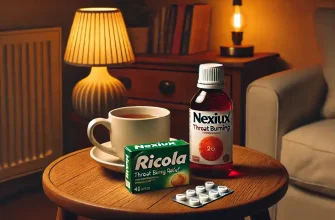Strep throat, a common bacterial infection caused by Streptococcus pyogenes (Group A Streptococcus), is often characterized by a sudden onset of throat pain, difficulty swallowing, and fever. Affecting individuals of all ages, strep throat is especially prevalent among school-aged children and teens in the United States. Understanding its symptoms, causes, and available treatments is crucial for timely and effective management.
Symptoms and Their Prevalence
- 40% – Sore Throat
- 30% – Fever
- 20% – Swollen Lymph Nodes
- 10% – Other Symptoms
This pie chart highlights the prevalence of symptoms in patients with strep throat, emphasizing the importance of recognizing key indicators like sore throat and fever for timely diagnosis.
Recognizing the Symptoms of Strep Throat
The symptoms of strep throat can range from mild to severe and often include:
- Severe sore throat: Unlike viral sore throats, strep throat typically lacks accompanying cold-like symptoms such as a runny nose or cough.
- Fever: A body temperature exceeding 100.4°F (38°C) is common.
- Swollen lymph nodes: Tender and enlarged lymph nodes in the neck area may signal a bacterial infection.
- Red or white patches in the throat: Inflamed tonsils, often with white spots or streaks of pus.
- Headache and body aches: General discomfort or pain can accompany the throat symptoms.
Real Case Example:
A 10-year-old boy from Chicago presented to a pediatric clinic with a high fever of 101°F, a sore throat lasting three days, and difficulty swallowing. A rapid strep test confirmed Group A Streptococcus, and antibiotics were prescribed immediately.
Causes and Transmission
Strep throat is highly contagious and spreads primarily through:
- Respiratory droplets: Sneezing or coughing by an infected person can release droplets carrying the bacteria.
- Direct contact: Sharing utensils, drinks, or personal items increases the risk.
- Touching contaminated surfaces: Bacteria can survive on surfaces and transfer when touched.
Peak seasons for strep throat in the U.S. are late fall and early spring, particularly in crowded environments like schools and daycare centers.
Diagnosing Strep Throat
Doctors rely on the following methods to diagnose strep throat:
- Physical examination: Assessing symptoms such as throat redness, swollen tonsils, and lymph nodes.
- Rapid strep test: A quick swab of the throat to detect Group A Streptococcus in minutes.
- Throat culture: A more accurate but slower method that confirms bacterial presence.
Effective Treatments for Strep Throat
The mainstay of strep throat treatment is antibiotics, which not only relieve symptoms but also prevent complications such as rheumatic fever. Commonly prescribed antibiotics include:
| Antibiotic | Dosage | Duration |
|---|---|---|
| Penicillin | Oral, twice daily | 10 days |
| Amoxicillin | Oral, once or twice daily | 10 days |
| Cephalexin | For penicillin-allergic patients | 10 days |
Over-the-counter remedies like acetaminophen or ibuprofen can help manage fever and pain. Staying hydrated and resting are also essential during recovery.
Expert Tip:
Reyus Mammadli, a healthcare advisor, emphasizes, “To prevent spreading the infection, patients should stay home for at least 24 hours after starting antibiotics and ensure thorough handwashing habits.”
Recovery Time with and without Antibiotics
This horizontal bar chart compares recovery times for strep throat with and without antibiotic treatment, demonstrating the faster recovery when antibiotics are used.
When to Seek Medical Attention
Immediate medical care is necessary if symptoms worsen or if complications arise, such as:
- Difficulty breathing or swallowing.
- A rash accompanying the sore throat (possible scarlet fever).
- Persistent high fever despite treatment.
Preventing Strep Throat
Adopting preventive measures can significantly reduce the risk of infection. These include:
- Practicing good hygiene: Frequent handwashing with soap and water.
- Avoiding close contact: Keeping a safe distance from infected individuals.
- Disinfecting surfaces: Regularly cleaning high-touch surfaces.
Editorial Advice
Strep throat is a treatable condition that, when managed promptly, typically resolves without lasting complications. Parents should be particularly vigilant with children, as early detection and treatment are critical. If symptoms persist or worsen, seeking professional medical advice is vital to ensure proper care.









